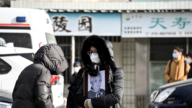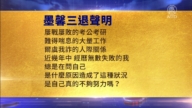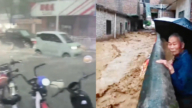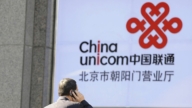【新唐人2012年10月4日讯】台湾“金马奖”主办方10月2号宣布,大陆导演娄烨的《浮城谜事》获得了年度金马奖7项提名。不过在大陆,《浮城谜事》在公映前突然遭遇“再审”风波,差点无法如期上映,导演娄烨也宣布放弃公映版的“导演署名”。这不禁让人想问,在中国的电影审查制度下,一个导演要拍摄自己理想的影片到底有多难?
《浮城谜事》是大陆首部取材于网络的真人真事电影,讲述一个男人因婚外恋导致了一桩离奇的车祸命案,从而引发出一个情爱秘密事件。
《法新社》星期二说,这部影片因为涉及敏感题材,例如:中共警察的腐败和新富阶层的行为方式,因此,引起大陆审查当局的不满。
香港作家、自由撰稿人张成觉表示,片中涉及中国警察的腐败和色情场面,导演和当局之间的角力必然发生。
香港作家张成觉:“拍片这位,他是有观察力,有这么一个魄力来拍这么样一个题材。那麽从大陆当局的角度,肯定是要对他进行阻挠的。它有一句话叫做‘无产阶级专政的坚强柱石’,军队和警察,包括武警,都是他们维护这个政权的最主要工具,那麽,它当然要保护自己这些工具。”
《浮城谜事》剧本审查5个月、电影成片23天过审,今年5月在“戛纳电影节”首映时,片头已经带上了所谓的“龙标”,代表影片已顺利获得内地的“公映许可证”,此后正式宣布10月19号在全中国公映。
然而,在距离中国公映的41天,审查当局罕见的再次要求娄烨修改影片。娄烨拒绝,并将所有电影审查信息在个人微博上公布。
最后,双方达成妥协。娄烨同意将结尾做一个3秒23格的“淡出”技术处理。广电总局同意影片如期公映。但是娄烨发表微博,宣布了一个电影史上前所未有的决定——取消《浮城谜事》这个第二次电影审查修改公映版的“导演署名”。
在中国的电影审查制度下,一个导演要拍摄自己理想的影片到底有多难?
北京独立制片人杨伟东也有类似的经历。他从2008年开始着手拍摄一部叫《需要》的记录片,计划采访500位中国最有影响力的学者和政要,以他们对一组问题的回答,来记录他们对基本价值观的看法。
北京独立制片人杨伟东:“他审查了我至少有将近两年了,把我电脑搜走了,把我磁带搜走了,什么结果都没有。”
当局不仅拖延审查杨伟东所拍记录片剧本的时间,到目前,杨伟东出门还被跟踪,手机遭到监听,当局还通知他不能离境。
杨伟东:“他就说我采访了很多敏感的人,说我们的访谈会殃及到国家政治的稳定和安全。他没有标准,只要是涉及到他自己的利益的时候,他就说这是敏感的。他现在把我也变成敏感的人,说我会殃及到这个国家的稳定。”
娄烨的《浮城谜事》入围了2012年第65届“戛纳国际电影节”里唯一的华语片。与中国国内不同待遇的是,目前《浮城谜事》已经销售到德国、英国、日本等10多个国家。
娄烨9月6号在微博上表示:“不要害怕电影!电影没那么可怕,也没那么重要。如果一个国家一个政体因为电影而感到恐惧,那绝对不是因为电影太强,而是因为他们自己太脆弱了。”
采访/李韵 编辑/尚燕 后制/黎安安
Chinese Censorship Hinders Filmmakers
On October 2, Chinese director Lou Ye’s film
‘Myth on the Floating City’ won 7 nominations at the Taiwan Golden Horse Film Festival.
However, in mainland China, the film had a difficult
battle against censorship, and barely managed to maintain it’s public screening date.
Lou Ye was forced to remove his name from the cast roll.
This reflects the real difficulty that Chinese film makers
are facing now under the current censorship system.
‘Myth on the Floating City’is a film based on real events,
telling the story of a man who entered into out of marriage
affairs, and suffered a car accident.
AFP reports stated Chinese authorities were not satisfied
with the film, because it touched some sensitive issues.
These included corruption of Chinese police officers,
and the behavior of China’s new wealthy class.
HongKong Writer Zhang Chengjue said the film
showcases the corruption of Chinese police.
This will naturally trigger a battle between
the director and the Chinese authorities.
Zhang Chengjue: “The film maker made his observation.
He is courageous in choosing such a topic.
From the point of view of the authorities,
it is certain they will stop this.
They always say that police are ‘a strong pillar
of the dictatorship of the proletariat’.
Police are a tool in maintaining power,
so they will protect their tools."
The film was under censorship for 5 months.
At its premier at Cannes Film Festival,
the film was marked with a ‘dragon seal".
This showed that it had been approved
for public screening in China.
It was announced that they will go public on October 19.
However, 41 days before the public screening, Chinese
authorities asked director Lou Ye to change certain content.
This request was rejected by the filmmaker.
Lou also published all the censorship
information on his personal micro-blog.
In the end, the two parties reached a compromise.
Lou agreed that he will technically fade out
the ending 3 seconds of the film.
Authorities then allowed him to do a public screening.
However, Lou announced on his personal micro-blog
that he made an unprecedented decision in film history.
This was to cancel the director’s name
from the credits of the revised film.
One can only wonder how hard it would be for the director
to make the film he wants to make under current censorship.
Independent Beijing producer Yang Weidong had similar
experiences, when he started his movie ‘Need’in 2008.
He planned to interview 500 of the most influential
scholars and politicians,
making them answer a number of questions,
and recording their view on basic values.
Yang Weidong: “I was censored for 2 years.
My computer was confiscated and my
tapes also. No result whatsoever."
Authorities not only postponed indefinitely
the censoring time of his movie script.
They also sent secret agents to follow him
and tapped his telephone conversations.
He was also told that he was not allowed to leave China.
Yang Weidong:"They said that I interviewed
many sensitive people,
claiming that my interviews would affect the stability
of the country. They didn’t have any standards.
Whenever it touches their interests,
they would say it is sensitive.
They turned me into a sensitive person, labeling
me as affecting the stability of the country."
‘Myth on the Floating City’is the only Chinese movie
that won nominations at the 65th Cannes Film Festival.
Compared with the situation inside China,
it has been sold in more than 10 countries now.
Lou Ye wrote on his micro-blog, don’t be afraid
of the movie. It is not so horrible, not so important.
If a state power felt threatened by a movie, it is not because
the movie is too strong, but because they are too weak.



























